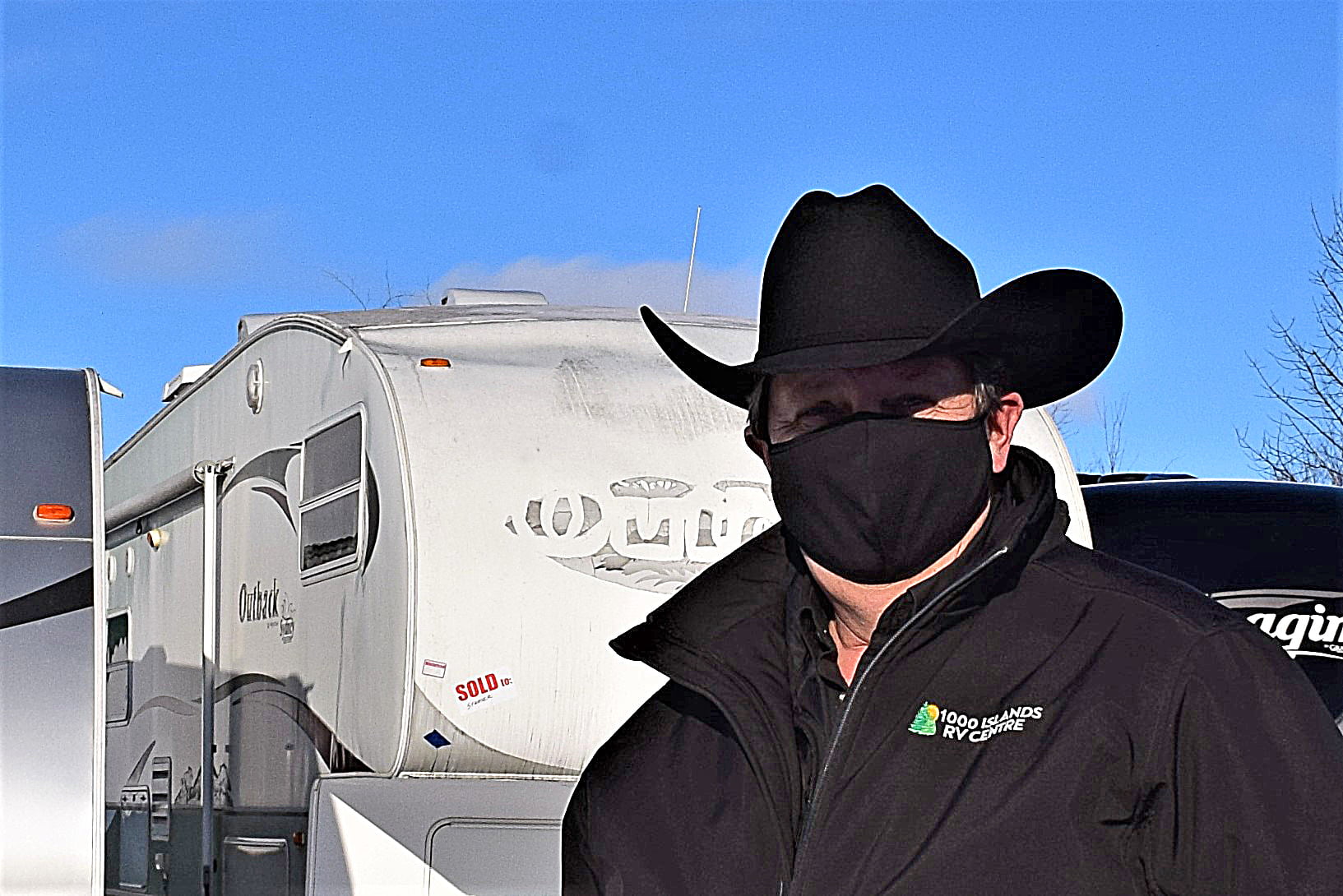RV dealerships across Canada have seen sales soar during 2020, and the start of 2021 follows the same pattern. The pandemic is driving the number of RV sales up along with prices, as people turn to camping vacations in new and used luxury RVs.
This is a non-technical list of what to look for, what questions to ask yourself, and what questions to ask RV dealers.
Gaining the knowledge contained here will win you the salesperson’s respect and place you in a better decision-making position.
Using this list for your next used RV purchase may save you thousands of dollars.
COVID-19 is giving the RV industry a boost. According to Kim Smith “The Honest Cowboy,” a salesman at 1000 Islands RV Centre in Gananoque, Ontario, “2020 was my best sales year on record. People of all ages are discovering that camping in a new or used RV is a great experience.”
While showing me around the used RV units, the Cowboy added “With an RV, you can get away from the house for weekends or months at a time. With our COVID-19 restrictions, my clients are enjoying Canadian campgrounds closer to home. They follow the social distancing rules while experiencing the freedom and fun of the RV lifestyle.”
Questions for You to Answer
- Who will typically be travelling with you?
- What type of vehicle do you see yourself using? Truck Camper, Motorhome, Fifth Wheel, or Travel Trailer?
- Why do you want an RV? For family weekends or to use fulltime?
- Where do you plan to take the RV?
- When do you plan to use the RV, winter and/or summer?
- How much are you prepared to spend on the RV?
With these questions settled you’re ready to roll. You now know what type/size/cost of RV you are looking for, so take this list, start shopping, and have fun.
Purchase or Rent, New, or Used?
Linda and I have purchased three RVs in 16 years of RVing. One new and two used, all from local dealers here in Ontario. Campkin’s RV Center in Whitby, and 1000 Islands RV Centre in Gananoque.
If you are looking for a used RV, and debating between going private versus a dealer, I recommend buying from a reputable dealer. Build a relationship with an RV dealership; the payoff is invaluable.
- The dealership recognizes that an RV is a big purchase, and they want you to own an RV that you will be happy with.
- A dealer will perform certified tests and inspections for you that a private buyer can’t.
- If you buy privately, you may appear to save money, but it is a “Buyer Beware” market, and there is no warranty from a private seller.
- A reputable RV dealership has a network of service facilities across North America.
- Your RV dealership will provide telephone support when equipment breaks down — even if you have problems 5,000 km away from home — and can recommend a local service dealership.
- I purchased an extended warranty on each of the RV’s I have owned. It was worth the cost — even new rigs break down.
- If in doubt, consider renting before you make the final decision.
Ask the Seller to Prepare the RV for Your Inspection.
Make it clear to the seller that you want to spend time inspecting the unit. Keep four areas in mind: water damage, electrical problems, bodywork, and mechanical issues.
For your inspection, arrange with the seller to have the following services connected:
- Charge the 12volt battery
- Connect the shore 120 VAC electrical service cable
- Propane in the tank
- Water in the fresh-water tank
- Connect the town water hose to the trailer
- Connect the sewer line
Ask the Seller to Prepare the RV for Your Inspection.
Make it clear to the seller that you want to spend time inspecting the unit. Keep four areas in mind: water damage, electrical problems, bodywork, and mechanical issues.
For your inspection, arrange with the seller to have the following services connected:
- Charge the 12volt battery
- Connect the shore 120 VAC electrical service cable
- Propane in the tank
- Water in the fresh-water tank
- Connect the town water hose to the trailer
- Connect the sewer line
What to Look for When Inspecting the Outside, Structure and Physical Integrity
When examining the outside of a used trailer, you are always looking for telltale signs of accidents, misuse, water ingress, and a cover-up.
- A certified technician should check out a motorhome with a big diesel engine and a low mileage. Engine problems are expensive.
- A travel trailer or fifth wheel that looks hardly used but has covered thousands of kilometres is suspect.
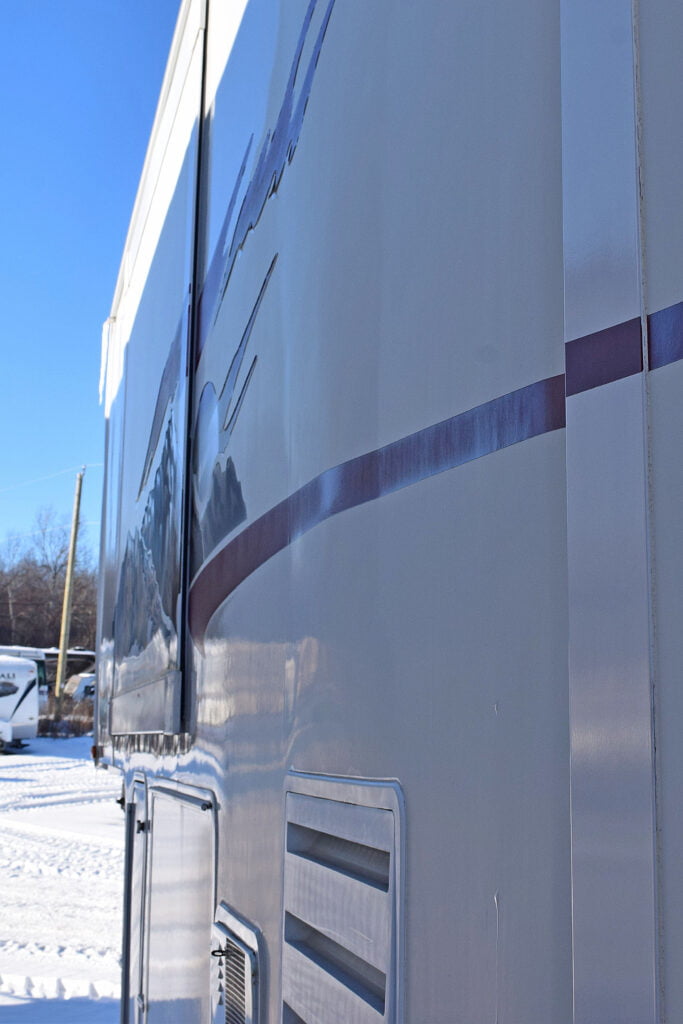
- Side-panel delamination. Walls are often made of fibreglass that is glued or laminated onto a wood panel. The ingress of water causes separation of the fibreglass from the wood, delamination. Place your head against the outside wall surface, it should appear flat. Look for large swollen areas. These swollen areas are an expensive fix. Is this the time to walk away or get a fair price?
- Look for collision damage. Any unrepaired bodywork damage is a potential water problem.
- Inspect caulked joints. Ask questions about any apparent repairs.
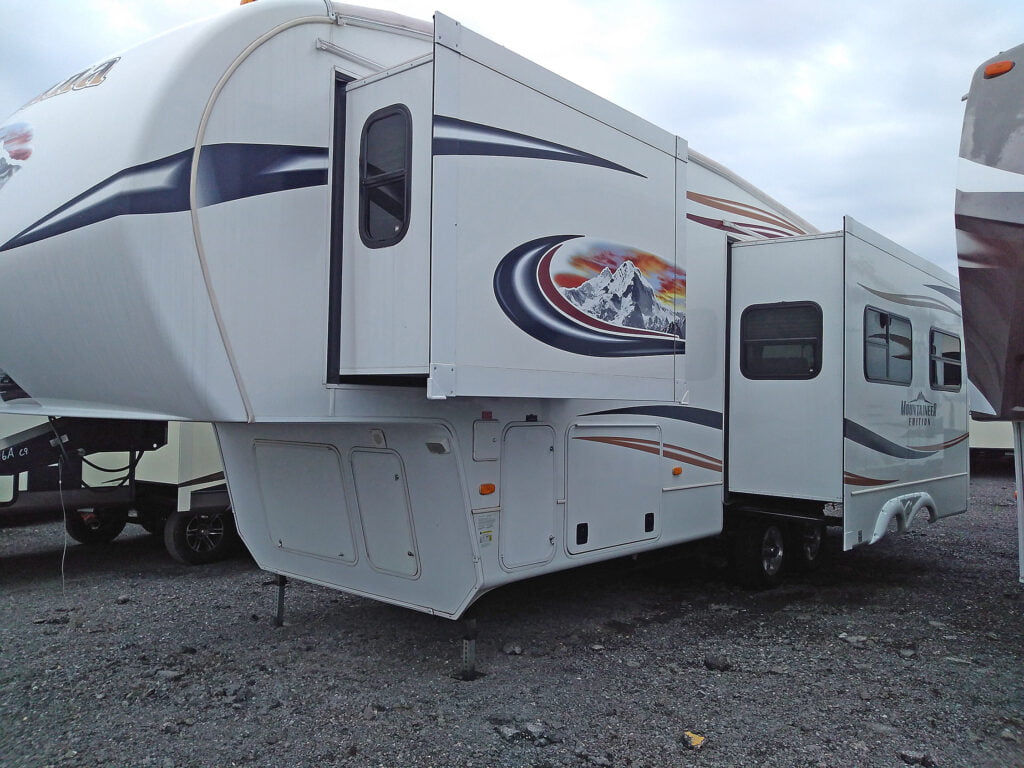
- Open the awnings and slide-outs, demonstrating they work. Check the canvas for tears, mildew, and general wear. Some slides have rollout covers.
- Check all outside lights are working.
- Under the trailer, check for loose wires, cables and pipes. Inspect underbelly for damaged or repaired covering. Ask questions about any apparent repairs.
- Inspect chassis for excessive rust or damage. Ask questions.
- Are all visible water drains capped?
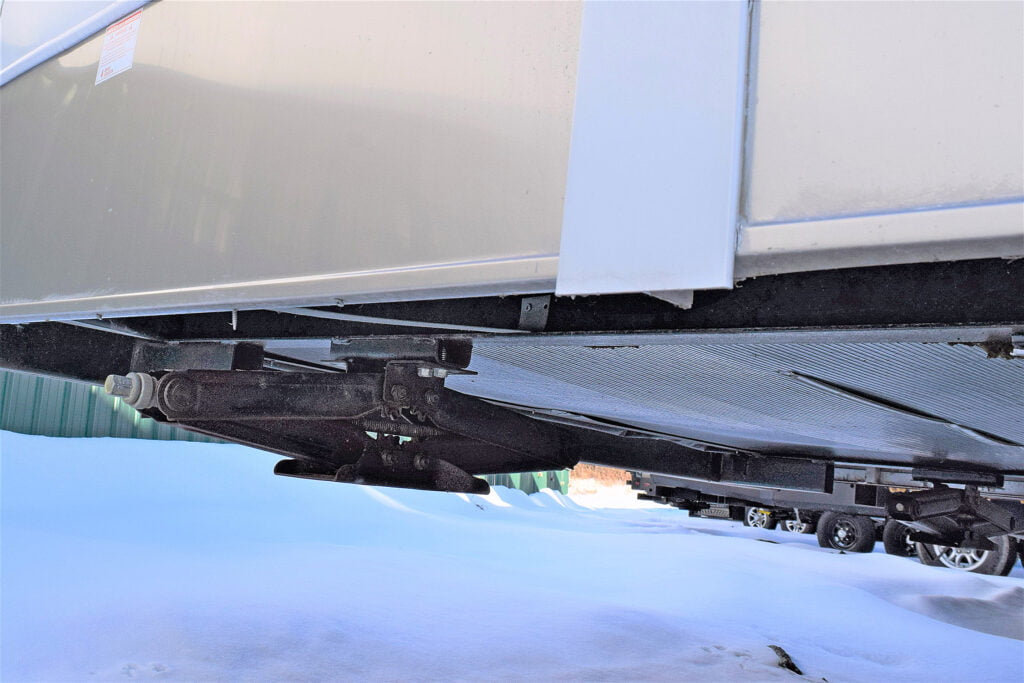
- Operate all landing and stabilizer legs to confirm operability.
- Operate the door and hatch locks to confirm they are working correctly.
- Inspect window seals for signs of leaks or damage.
- Inspect ladder mountings.
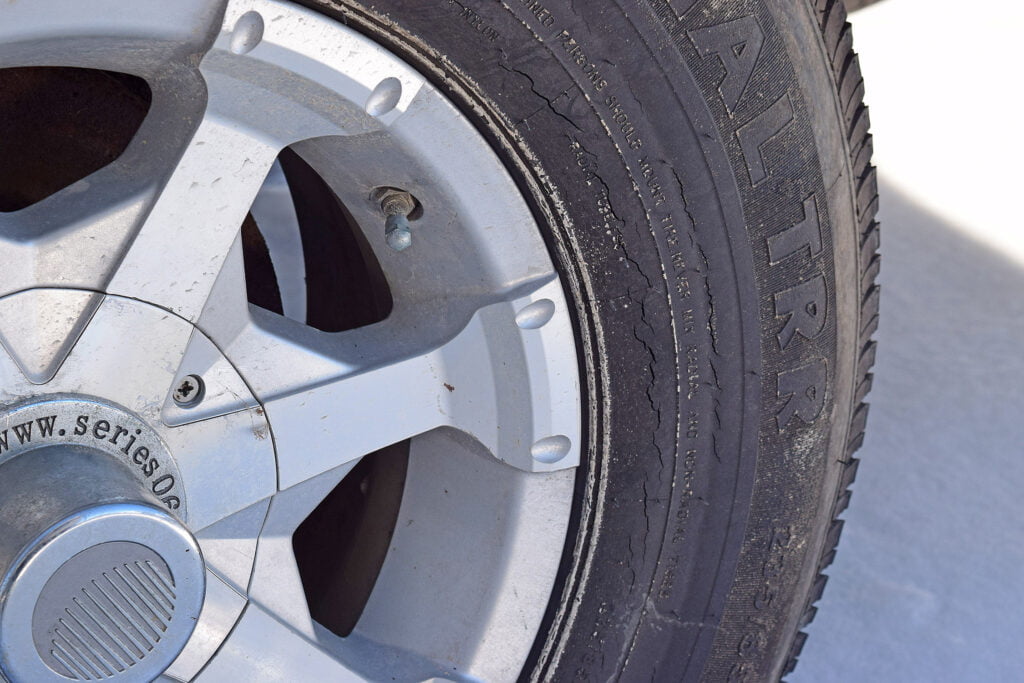
- Tires. Many RVs are not driven far and show little wear on the treads, but the tires sit under load all their life. Inspect for cracks on sidewalls, uneven wear, and tire age. Tires can look to be in good condition, but an RV tire has a recommended life of 3-7-years. RV tires degrade quickly due to the load, time, sunlight, and bumps in the road. They lose their flexibility and grip on the road. Ask the dealer to explain how you can check the tire’s date code.
- Springs and spring hangers. Trailer springs occasionally crack. Broken springs can cause structural damage to the chassis. Clear the mud around the spring hangers and look for cracks or repair welds.
- Brakes and wheel bearings. Have a dealer inspect the brakes and regrease wheel bearings before you purchase.
Where to Look for Water Damage Inside and Out
- Check the floor to wall edges of the kitchen, bathroom, toilet, and underbelly storage area. Look for mildew or dark stains.
- Check bathroom and kitchen counters. Check countertops for swelling or lose edges stripping.
- The storage areas give a good indication of leaks. Look for telltale stains.
- Check the floor under windows, near the kitchen and bathroom for soft spots.
- Check all window seals inside and out.
- Carpets and laminated floor covering. Look for swelling.
Inspecting the 12 VDC and 120 VAC Electrical Systems
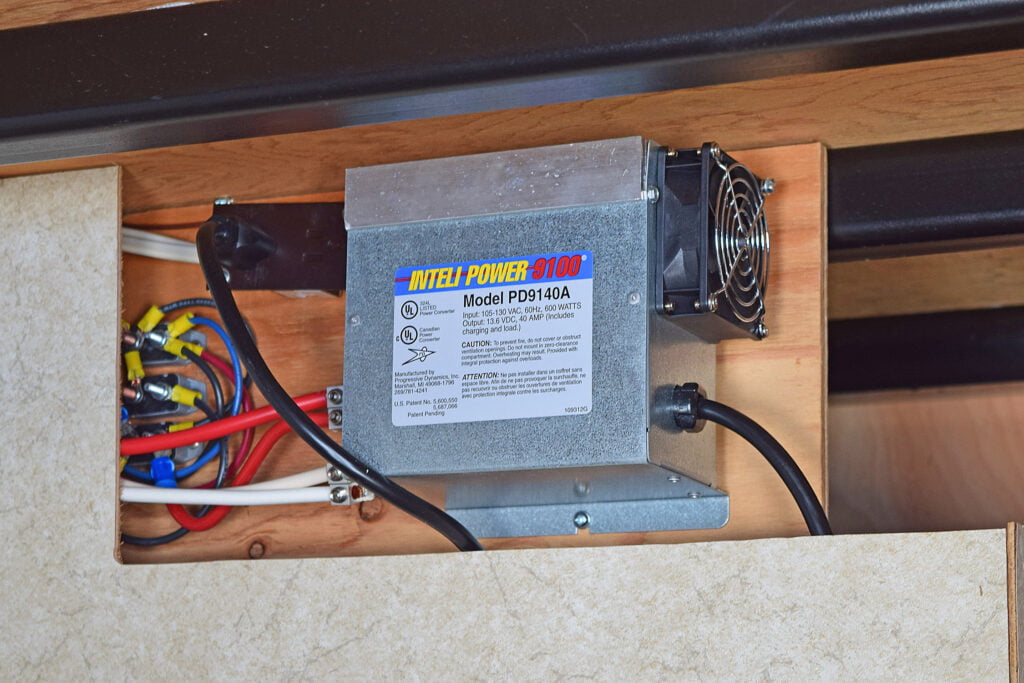
- RV batteries provide 12 VDC power. They are charged from the tow vehicle alternator, usually by a single fuse in the tow vehicle. When plugged into the mains, a 120 VAC/12 VDC converter charges the batteries. Ask the dealership to confirm the charging systems are working.
- Check the external condition and water level of the battery (if applicable). It would be best if you replaced RV trailer batteries about every four years. Ask the dealer for a new battery.
- Check for damage to the main trailer/truck electrical connection cable (if applicable).
- Operate light switches or appliances individually.
- Ask the dealership to confirm all outlets are working.
- Operate every appliance to determine that it performs its function.
- AC Unit(s)
- Ceiling fans — and don’t forget the kitchen fan that may be part of the microwave.
- Check electrical operation of the fridge and water heater
- Check operation of microwave and any portable appliances such as TV and multi-media devices that come with the sale price.
- Central vacuum if installed, check that all connections work.
How to Inspect the Propane System
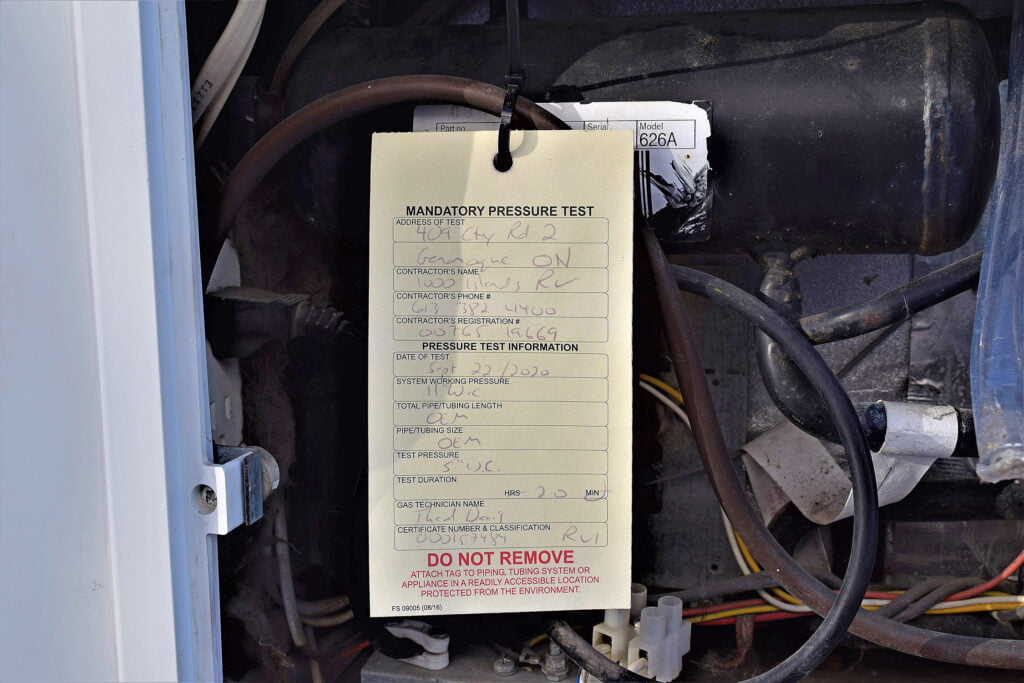
- Propane system. Ask the dealer for a certified gas inspection certificate before you buy. Make sure the inspector checks all burners, system pressure, and regulator.
- Propane Heater. It should be part of the certified gas inspection certificate. Confirm with the dealership before you buy.
- Propane/electrical fridge-freezer. It should be part of the certified gas inspection certificate. Confirm with the dealership before you buy.
- Kitchen stove. It should be part of the certified gas inspection certificate. Confirm with the dealership before you buy.
- Check the age of gas bottles’ date codes. Ask the dealer to explain. More information at Ferrell Gas
- Carpets and laminated floor covering. Look for swelling.
- In Canada, it is illegal to refill a free-standing propane bottle if it is more than 10 years old. In the USA, the maximum age of a tank is 12 years. In Mexico, it must be a tank. (personal experience)
Fresh, Grey, and Black Water Holding Tanks Valves and Fitting
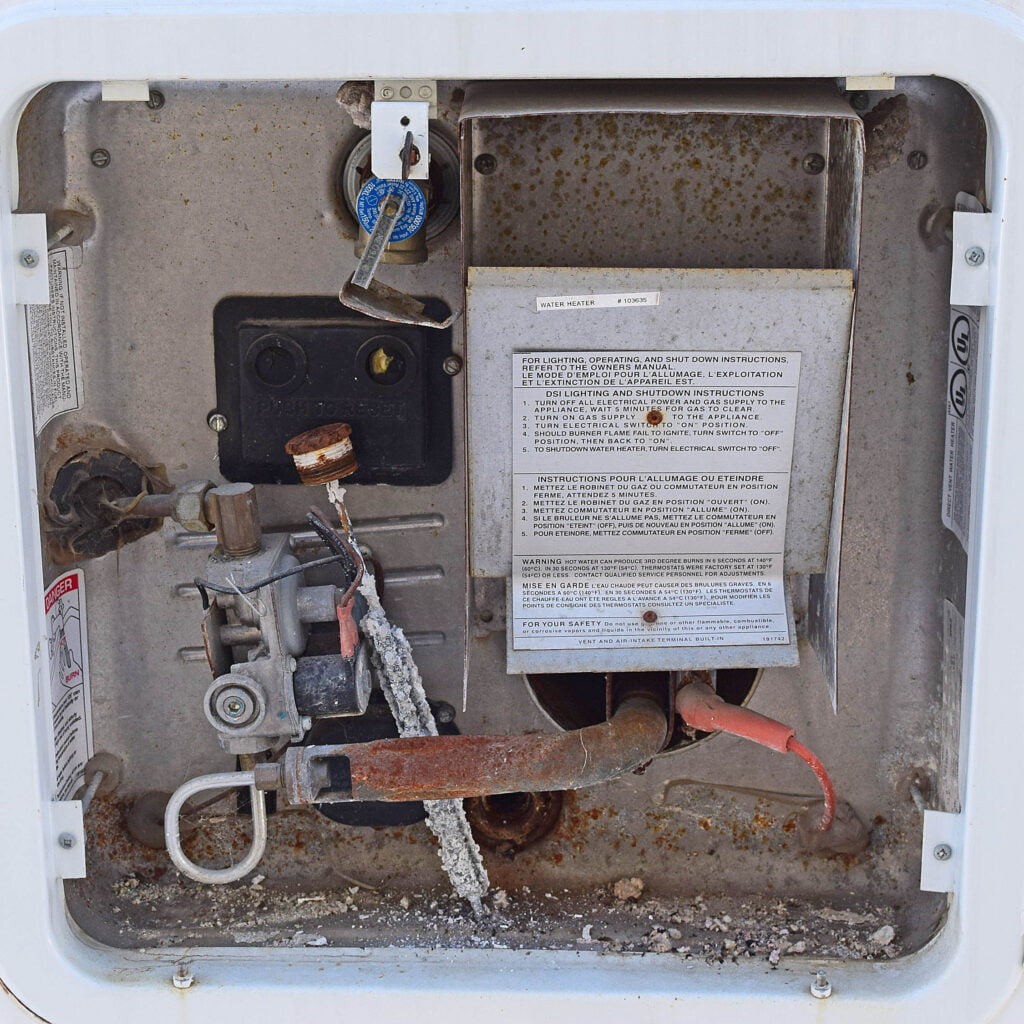
- Ask the dealer to demonstrate the water heater on both gas and electric.
- The onboard 12 VDC fresh-water-pump takes water from the onboard fresh-water tank. When the pump is in service, the pump automatically turns off when the system reaches pressure. A leak in the plumbing system or a faulty pump will cause the pump to run continuously.
- Run both hot and cold water out of all faucets. Don’t forget the outside shower.
- Flush the toilet. Look for water leaks.
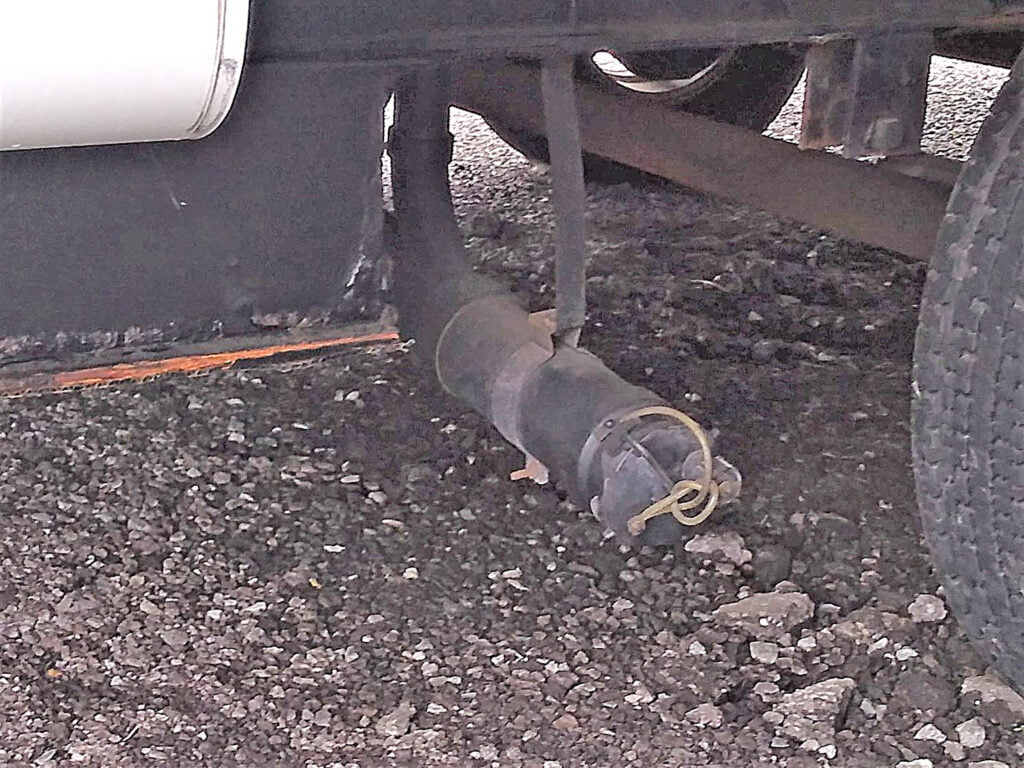
- Ask the dealer to demonstrate, not just explain, the draining of tanks. It is common for the dump tank valves to leak, and it can be expensive to fix. With the dump valves closed, run water into all tanks. No liquid should come out at the drain with the travelling cap removed.
- If connected to a sewer, have the dealer open and close each dump valve, allowing water to flow, and the flow stops when the valve is again closed.
What is the Condition of the Roof, Roof-fittings?
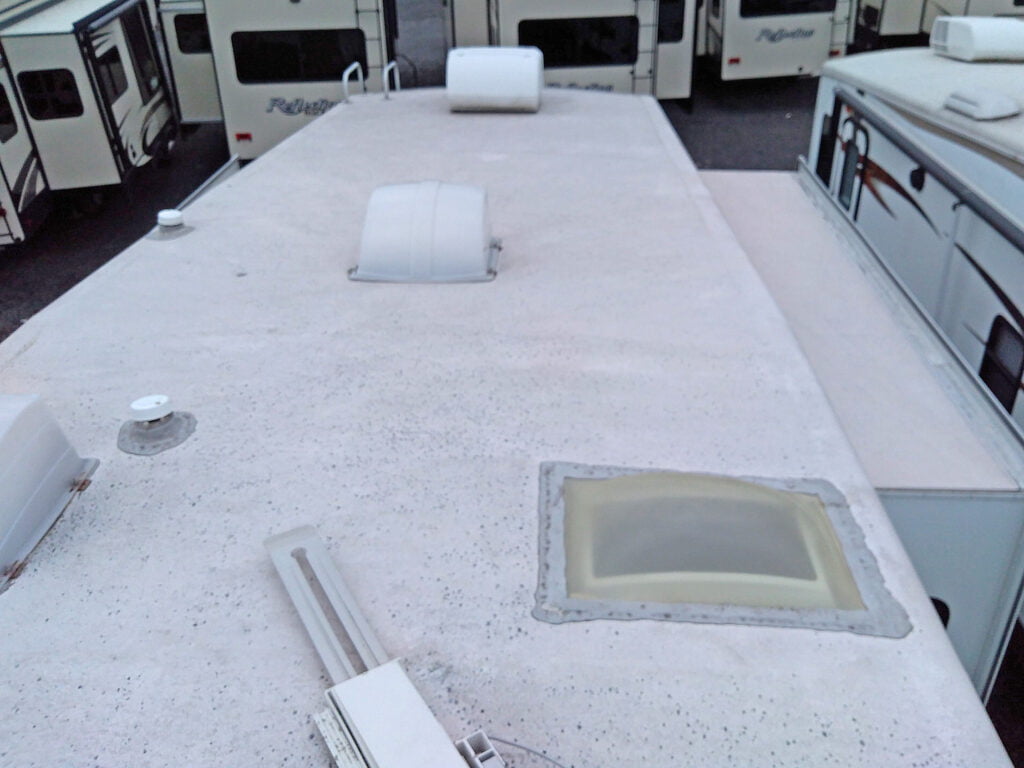
- Roof – Many RVs have a soft EPDM rubber material. Check for damage caused by contact with tree branches, UV light, or mildew. Check all seams for caulking. Ask questions.
- Roof vents – Check for physical damage from contact with branches or deterioration due to UV Light.
- Gutters – Dirty marks running down the RV sides indicate blocked or damaged roof gutters.
You, Too, Can Make This Dream Come True
People have told us that we are living their dream. The dream is in the journey — the adventure of exploring Canada, North America, and Mexico.
With the savings you can make with the purchase of a used unit, you, too, can make this dream come true.

